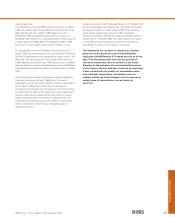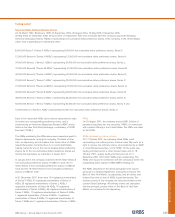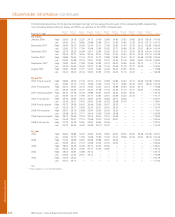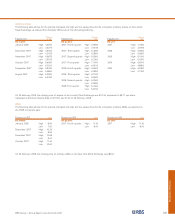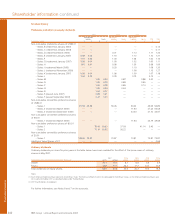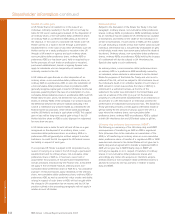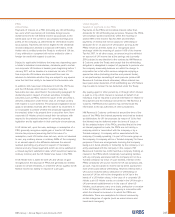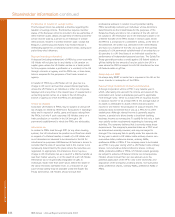RBS 2007 Annual Report Download - page 248
Download and view the complete annual report
Please find page 248 of the 2007 RBS annual report below. You can navigate through the pages in the report by either clicking on the pages listed below, or by using the keyword search tool below to find specific information within the annual report.
RBS Group • Annual Report and Accounts 2007
246
Shareholder information continued
Shareholder information
EU Directive on taxation of savings income
The European Union has adopted a directive regarding the
taxation of savings income. The Directive requires member
states of the European Union to provide to the tax authorities of
other member states details of payments of interest and other
similar income paid by a person to an individual or certain
other persons resident in another member state, except that
Belgium, Luxembourg and Austria may instead impose a
withholding system for a transitional period unless during such
period they elect otherwise.
Disposal (including redemption)
A disposal (including redemption) of PROs by a non-corporate
US Holder will not give rise to any liability to UK taxation on
capital gains unless the US Holder carries on a trade (which
for this purpose includes a profession or a vocation) in the UK
through a branch or agency and the PROs are, or have been,
held or acquired for the purposes of that trade, branch or
agency.
A transfer of PROs by a US Holder will not give rise to a
charge to UK tax on accrued but unpaid interest payments,
unless the US Holder is an individual or other non-corporate
taxpayer and at any time in the relevant year of assessment or
accounting period carries on a trade in the UK through a
branch or agency to which the PROs are attributable.
Annual tax charges
Corporate US Holders of PROs may be subject to annual UK
tax charges (or relief) by reference to fluctuations in exchange
rates and in respect of profits, gains and losses arising from
the PROs, but only if such corporate US Holders carry on a
trade, profession or vocation in the UK through a UK
permanent establishment to which the PROs are attributable.
Inheritance tax
In relation to PROs held through DTC (or any other clearing
system), the UK inheritance tax position is not free from doubt
in respect of a lifetime transfer, or death of, a US Holder who
is not domiciled nor deemed to be domiciled in the UK for
inheritance tax purposes; HM Revenue & Customs is known to
consider that the situs of securities held in this manner is not
necessarily determined by the place where the securities are
registered. In appropriate circumstances, there may be a
charge to UK inheritance tax as a result of a lifetime transfer at
less than market value by, or on the death of, such US Holder.
Inheritance tax is not generally chargeable on gifts to
individuals made more than seven years before the death of
the donor. However, exemption from, or a reduction of, any
such UK tax liability may be available under the Estate Tax
Treaty (see below). US Holders should consult their
professional advisers in relation to such potential liability.
PROs beneficially owned by an individual, whose domicile is
determined to be the United States for the purposes of the
Estate Tax Treaty and who is not a national of the UK, will not
be subject to UK inheritance tax on the individual’s death or on
a lifetime transfer of the PRO, except in certain cases where
the PRO (i) is comprised in a settlement (unless, at the time of
the settlement, the settlor was domiciled in the United States
and was not a national of the UK); (ii) is part of the business
property of a UK permanent establishment of an enterprise; or
(iii) pertains to a UK fixed base of an individual used for the
performance of independent personal services. The Estate Tax
Treaty generally provides a credit against US federal estate or
gift tax liability for the amount of any tax paid in the UK in a
case where the PRO is subject to both UK inheritance tax and
US federal estate or gift tax.
Stamp duty and SDRT
No stamp duty, SDRT or similar tax is imposed in the UK on the
issue, transfer or redemption of the PROs.
Passive Foreign Investment Company considerations
A foreign corporation will be a PFIC in any taxable year in
which, after taking into account the income and assets of the
corporation and certain subsidiaries pursuant to applicable
“look-through rules,” either (i) at least 75% of its gross income
is “passive income” or (ii) at least 50% of the average value of
its assets is attributable to assets which produce passive
income or are held for the production of passive income. The
company does not believe that it was as a PFIC for its 2007
taxable year. Although interest income is generally passive
income, a special rule allows banks to treat their banking
business income as non-passive. To qualify for this rule, a bank
must satisfy certain requirements regarding its licensing and
activities. The company believes that it currently meets these
requirements. The company’s possible status as a PFIC must
be determined annually, however, and may be subject to
change if the company fails to qualify under this special rule
for any year in which a US Holder holds ordinary shares, non-
cumulative dollar preference shares, ordinary ADSs,
preference ADSs or PROs. If the company were to be treated
as a PFIC in any year during which a US Holder holds ordinary
shares, non-cumulative dollar preference shares, ordinary
ADSs, preference ADSs or PROs, US Holders would generally
be subject to adverse US federal income tax consequences.
Holders should consult their own tax advisers as to the
potential application of the PFIC rules to the ownership and
disposition of the company’s ordinary shares, non-cumulative
dollar preference shares, ordinary ADSs, preference ADSs or
PROs.



